|
Today we celebrate the heavenly birthday of one of my dearest friends, St. Francis de Sales. It is often said that the saints choose you, and I have certainly found that to be the case with Francis. Since I first “met” him while reading a book about the saints, he has continued to captivate and encourage me.
Francis was born in France in 1567 to an aristocratic family. He was well educated, and while his father hoped this would lead Francis to a career in law, his studies ended up leading him to the priesthood. He was a sought-after spiritual director (perhaps his most well-known directee was St. Jane Frances de Chantal with whom he started the Visitation Sisters). Francis was also devoted to evangelization and catechesis through preaching and writing, and had a love of the poor which was manifested through works of charity and his own detachment from material things. He was canonized a saint in 1665 and named a Doctor of the Church in 1877. One of the things that makes a saint is that their life and teaching transcend time and remain relevant over the centuries. This is certainly true of St. Francis de Sales. While Vatican II affirmed the universal call to holiness in the 1960s, Francis ardently promoted this teaching three centuries prior. When St. Jane Frances de Chantal wanted to leave her duties as a mother for the “higher” calling of entering religious life, Francis encouraged her to have patience and fully embrace her current vocation as a mother. Rather than imagining that holiness is better achieved in religious life, he reminded her that faithfulness to the real life unfolding before her was the place for her to become holy. As he said to another directee in An Introduction to the Devout Life, “work in quiet cooperation with him, and then rest satisfied that if you have trusted entirely to him you will always obtain such a measure of success as is most profitable for you, whether it seems so or not to your own individual judgment.” When Francis was named a Doctor of the Church, it was under the title Doctor of Divine Love. Francis’ personal devotion to the Lord and life of ministry flowed from his own love for God and awareness of God’s love. When Francis’ devoted friend, Bishop Jean-Pierre Camus, questioned him about how to grow in love of God and neighbor, Francis replied simply, “You learn to speak by speaking, to study by studying, to run by running, to work by working. Just so you learn to love God and many by loving. If you really want to love God, go on and love Him more and more.” This simple approach to God is a hallmark of Francis’ spirituality. Without pretending that such growth in holiness would be quick or easy, he offered straightforward guidance that people in any vocation or stage of life could follow. While we may not be able to love God perfectly and completely today, we can certainly strive for that and lay our foundation today. Francis shows us that God’s love toward us and our love toward God are reciprocal, growing in relation to one another. One of my favorite quotes from St. Francis de Sales is, “Have patience with all things, but chiefly have patience with yourself.” Francis offers the guidance of a gentle, compassionate father. He knew firsthand the temptation towards despair at our lowliness before God, but he also knew personally that God offers us the grace we need in our pilgrimage towards Him. God knows each of us intimately–our strengths and our struggles–and looks into our hearts. Rather than being overwhelmed by our shortcomings, spiritual and otherwise, Francis encourages us to extend God’s own gentleness and patience to ourselves. As Francis says elsewhere, God “delights to show forth his power in our weakness, his mercy in our misery.” St. Francis de Sales, Doctor of Divine Love, pray for us! Further reading: Pope Francis. (2022). Totum Amoris Est: On the fourth centenary of the death of Saint Francis de Sales. Campbell, Colleen Carroll. (2020). The Heart of Perfection: How the Saints Taught Me to Trade My Dream of Perfect for God's. Howard Books. **This image is from https://www.catholic.org/saints/saint.php?saint_id=51**
0 Comments
Some weeks in the liturgical calendar are packed with all-stars! I am grateful that one of those weeks happens to be my birthday week. As I write this, I picture the saints lining up in order of their feast days just like we lined up in alphabetical order for lunch in elementary school. In the Cathedral of Los Angeles, Our Lady of the Angels, there is a beautiful tapestry that depicts the diversity of the saints as they stand side-by-side. If this lineup was based on feast day, St. Clare and St. Jane Frances would be next to one another. I imagine they would turn to one another and realize how much they have in common. Some of the many commonalities they share include having a best friend named Francis, founding a religious order, living in Europe, and finding great joy in serving the poor. In the Four Loves, CS Lewis writes, “Friendship is born at the moment when one man says to another ‘What! You too?’” When I studied abroad in Rome during college, I spent a weekend alone in Assisi walking in the footsteps of St. Francis and St. Clare. I prepared for this trip by reading a biography of St. Francis, I, Francis. For me, the most memorable part of the book was imagining Francis listening to Clare sing in the church choir and the way he felt when Clare shared his humble mission, chopped off her beautiful long hair, and donned a simple brown tunic. Visiting St. Clare’s incorrupt body in Assisi was astonishing; it seemed as if I could just wake her up from a nap and ask her all about her friendship with St. Francis. Her beauty radiates from her body today and I could only imagine what others experienced when they encountered her while she was alive. One day, while in grad school, I returned to my room after a retreat to find an icon of St. Jane Frances on my bed. My mom is named Jane Frances, so I was intrigued to learn more about this fascinating saint who experienced both married and religious life. She became a widow at thirty-two after her husband died in a hunting accident. On his deathbed, her husband forgave the man who killed him. Jane, however, was slower to forgive as she was deeply grieving. Eventually, she not only forgave the man, but also became the godmother of his child. Additionally, around this time, she began an eighteen-year-long correspondence through letters with Francis de Sales, who was only a few years older than her. He was the Bishop of Geneva and was the answer to her prayer for a spiritual director. They became fast friends and, as Francis wrote, “God, it seems to me, has given me to you. I’m more sure of it by the hour.” In my book Single Truth, I write how our “yes” is a gift and not an obligation. Love is focused on giving, not receiving. When we are grasping, we are not loving. While writing the book, I went on a yearlong dating fast. During this time, I felt more free to see men as brothers in Christ and not lose myself in the thought that everyone is a candidate for dating and marriage. I did not get distracted by what I may get from a person (i.e. relationship status or affection) and instead focused on being a friend. St. Clare and St. Jane were incredible models for faith and friendship. They both developed deep, authentic friendships with St. Francis of Assisi and St. Francis de Sales. They joined in their mission for the Kingdom and had friendships rooted in charity. To bring our focus back to the tapestry at Our Lady of the Angels, it is essential to notice how the saints are all facing the altar. St. Peter teaches us that keeping his eyes on Jesus allowed him to walk on water, but when he forgot who he was walking to, he sank. In our friendships, especially with the opposite sex, we can get distracted by our fleshly desires and human understanding. We grasp at and rush into something that is often less than what God intends for us. “It’s beautiful to be able to love on earth as we shall love in heaven.” – St. Francis de Sales Article 2347 of the Catechism reads, “The virtue of chastity blossoms in friendship. It shows the disciple how to follow and imitate him who has chosen us as his friends, who has given himself totally to us and allows us to participate in his divine estate. Chastity is a promise of immortality. Chastity is expressed notably in friendship with one's neighbor. Whether it develops between persons of the same or opposite sex, friendship represents a great good for all. It leads to spiritual communion.” Charity is a love that is directed outwardly instead of inwardly. If two people in a relationship try to out-love, out-forgive, and out-serve one another, there is a high probability that they will overcome whatever obstacles they face. St. Francis de Sales wrote to St. Jane Frances, “Never will it be possible for anything to separate me from your soul: our bond is too strong. Death itself would be incapable of undoing it.” As Easter people, we believe that death is not the end for those in friendship with Jesus. When loved ones pass away, we find hope in the Resurrection and look forward to seeing them again in Heaven. These four saintly friends have been powerful intercessors in this life and I am excited to share fellowship with them for eternity! Promotional Image Credit: https://angelusnews.com/voices/why-the-saints-can-do-great-things/
Ever struggle with attempting to find God in your daily life? Do you ever feel that you are just so busy that engaging in a personal relationship with the Lord seems out of the question? Do you struggle in attempting to recognize how God is acting in your life, at work, or in the classroom? I promise, you are not alone. Many of us struggle with finding God not only in the ordinary, but also in our busy lives. Different saints, such as St. Francis de Sales, even recognized how at times it can be challenging to find God’s presence in the ordinary. Surprising right?! Sometimes, it seems so difficult to find God in the mundane or in the office. Yet, this is exactly where we can find God’s presence—in the ordinary!
St. Francis De Sales, a Doctor of the Church and inspiration of the ever popular Salesian Spirituality, wrote in his famed Introduction to the Devout Life that “It is an error, or rather a heresy, to wish to banish the devout life from the regiment of soldiers, the mechanic’s shop, the court of princes, or the home of married people… Wherever we may be, we can and should aspire to a perfect life.” St. Francis De Sales advocates the notion that everyone is called to be in relationship with God no matter their specific state in life. For St. Francis De Sales, the soldier, the mechanic, the government officials, and the married couple—any lay person—can find God in the ordinary. God meets each of us were we are; his presence is not restricted to a building. Nevertheless, what are some practical ways in which we can find God in the ordinary? Again, St. Francis de Sales has more wisdom for us from his Introduction to the Devout Life, writing that “occasions do not often present themselves for the exercise of fortitude, magnanimity, and great generosity, but meekness, temperance, integrity, and humility are virtues that must mark all our actions in life.” When we refrain from boasting about our accomplishments in the office or when we refrain from lying to our professor regarding a string of absences from class, we are encountering God in the ordinary. When we simply take a minute in the beginning of the morning and offer our day to God, we are encountering God in the ordinary. When we take a moment to recognize a coworker’s kindness to a stranger or a fellow student’s concern for a student falling behind in class, we are encountering God in the ordinary. Encountering God is not solely done on in the pews or on the mountaintop. Instead, we can encounter God in the ordinary, in our everyday life. To learn more about seeing God in the ordinary, please visit our Prayer Resources page by clicking here. **This post was originally published on 6/3/2021** Ever struggle with attempting to find God in your daily life? Do you ever feel that you are just so busy that engaging in a personal relationship with the Lord seems out of the question? Do you struggle in attempting to recognize how God is acting in your life, at work, or in the classroom? I promise, you are not alone. Many of us struggle with finding God not only in the ordinary, but also in our busy lives. Different saints, such as St. Francis de Sales, even recognized how at times it can be challenging to find God’s presence in the ordinary. Surprising right?! Sometimes, it seems so difficult to find God in the mundane or in the office. Yet, this is exactly where we can find God’s presence—in the ordinary! St. Francis De Sales, a Doctor of the Church and inspiration of the ever popular Salesian Spirituality, wrote in his famed Introduction to the Devout Life that “It is an error, or rather a heresy, to wish to banish the devout life from the regiment of soldiers, the mechanic’s shop, the court of princes, or the home of married people… Wherever we may be, we can and should aspire to a perfect life.” St. Francis De Sales advocates the notion that everyone is called to be in relationship with God no matter their specific state in life. For St. Francis De Sales, the soldier, the mechanic, the government officials, and the married couple—any lay person—can find God in the ordinary. God meets each of us were we are; his presence is not restricted to a building. Nevertheless, what are some practical ways in which we can find God in the ordinary? Again, St. Francis de Sales has more wisdom for us from his Introduction to the Devout Life, writing that “occasions do not often present themselves for the exercise of fortitude, magnanimity, and great generosity, but meekness, temperance, integrity, and humility are virtues that must mark all our actions in life.” When we refrain from boasting about our accomplishments in the office or when we refrain from lying to our professor regarding a string of absences from class, we are encountering God in the ordinary. When we simply take a minute in the beginning of the morning and offer our day to God, we are encountering God in the ordinary. When we take a moment to recognize a coworker’s kindness to a stranger or a fellow student’s concern for a student falling behind in class, we are encountering God in the ordinary. Encountering God is not solely done on in the pews or on the mountaintop. Instead, we can encounter God in the ordinary, in our everyday life. To learn more about seeing God in the ordinary, please visit our Prayer Resources page by clicking here. “God withholds Himself from no one who perseveres.” –St. Teresa of Avila, Doctor of Prayer Perseverance always sounds nice; you hear the word and think “yes--I can do this!” Lately, I’ve been struggling to persevere in prayer. To combat this, I’ve found my American industriousness kicking in—resulting in my desire to impose on myself a strict prayer routine akin to that of St. Teresa’s (“If I just work hard enough, I’ll be levitating like St. Teresa in no time!”) only to wonder why it all seems to fall apart after 2 days. Discouragement soon follows, and I feel like I’m back at the beginning. I have fallen into this trap several times since I started taking my spiritual life seriously a few years ago. At the beginning, persevering in prayer and good spiritual habits can seem daunting. But the need for perseverance is a normal part of our spiritual journey. Sometimes prayer comes easily, sometimes we struggle to quiet our minds. As St. Josemaria Escriva said, “As the flames of your first enthusiasm die down, it becomes difficult to advance in the dark. —But that progress is all the more reliable for being hard. And then, when you least expect it, the darkness vanishes, and the enthusiasm and light return. Persevere! (Furrow No. 789)” It wasn’t until I heard the same advice from my spiritual director for the 100th time, combined with many Catholic podcasts and YouTube Videos, advice from friends, and books, that it finally dawned on me: you can and should tailor your spiritual life to fit your state in life and your personality! In doing so, you will find the strength to persevere. I made the mistake of thinking that the only way to grow in holiness was to follow the exact path of my favorite saints, only to end up frustrated as to why it wasn’t working or giving me any peace. After this struggle, I’ve learned four simple tips that have helped me develop better habits and persevere (and grow!) through a better spiritual routine.
As St. Francis de Sales also said, “Do not wish to be anything but what you are, and try to be that perfectly.” Get to know yourself, what spirituality works for you, and persevere! For more resources to deepen your spiritual life, click here. Ah, summer. The sun is shining. The beach is calling. There’s much more time for leisure (which is so important! Read Pieper if you need convincing.). For me, more leisure means more time to read and write and consequently, more time to explore the beauty of our faith. Here’s what I’m reading this summer:
2. Four Quartets by T.S. Eliot Speaking of works I will revisit for the rest of my life, I read Four Quartets multiple times a year, including every summer. I mentioned this genius work in a previous blog, and must bring it up again. This four-part poem from Eliot isn’t the lightest read, but there are plenty of commentaries out there for guidance. I recommend Dove Descending: A Journey into T.S. Eliot’s Four Quartets. Written after his conversion, Four Quartets can be read as a response to Eliot’s earlier, more famous and more despondent poem, The Wasteland. Whereas The Wasteland wonders whether a life of harmony and wholeness is possible in the modern world, The Four Quartets presents God’s plan for salvation history as not only possible, but ideal. And let me tell you, Eliot’s incredible verse is a spiritual game-changer. 3. Spiritual Writings by Flannery O’Connor, edited by Robert Ellsberg Flannery O’Connor never wrote formal ‘spiritual writings’; rather, this is a collection of her letters and other works that touch on spiritual topics. Her writing style is sharp and punchy and will have you on the edge of your seat. The collection includes one of Flannery’s more famous letters wherein she recounts her argument with a writer about the True Presence of Christ in the Eucharist. Flannery says to the writer who has just asserted that the Eucharist is mere symbol, “Well, if it's a symbol, to hell with it.” If you like literature of the American South, snappy comebacks, and/or want to join the Catholic hipster scene, Flan is your girl. 4. 40 Years with a Saint: Blessed Alvaro del Portillo on Saint Josemariá Escrivá by Cesare Cavalleri Saint Josemariá is a twentieth century saint who founded Opus Dei, a personal prelature in the Catholic Church that focuses on finding and serving God through everyday life. Opus Dei runs the Catholic Information Center in Washington D.C., where many young professionals like myself attend talks and social gatherings. This book is the thoughts of one saint on another saint. That’s pretty awesome. There are also many awesome YouTube videos with footage of St. Josemariá which I encourage you to watch; it’s wild that we live in an age where we have footage of saints in action! 5. Pier Giorgio Frassati: A Hero for Our Times by Cristina Siccardi Modern Catholic lore is full of epic stories about Blessed Pier Giorgio Frassati. One of my favorites is that he used to go to the local pool hall and hustle the other players. When he won, he didn’t take his opponents’ money, but instead had them spend an hour with the Blessed Sacrament. I picked up this book to verify these stories and to learn more about the man who proclaimed, "Verso l ‘Alto!" (“To the heights!”) It’s not disappointing. 6. Meeting Jesus Christ: Meditations on the Word by Msgr. J Brian Bransfield As Catholics, we tend to get a bad reputation for our lack of engagement with Scripture (even though every Sunday Mass is flooded with passages and references). This book helps us dive a bit deeper both familiar and more obscure Gospel passages. If you want to engage more with Scripture this summer, this book is a great place to start. 7. Laurus by Eugene Vodolazkin Everyone loves a good Russian novel and there are many (think Anna Karenina, War and Peace, Crime and Punishment, The Brothers Karamazov etc.). Laurus is a contemporary Russian novel about holiness. Laurus loses the love of his life when she dies giving birth, and the rest of the story is about how he comes to terms with his suffering and ultimately God. The book is extraordinary and the translation is superb. It’s also a great work of historical fiction, illustrating life in Russian during the Middle Ages. Comment below with what you are reading this summer! And don’t forget to check out the many Catholic Apostolate Center eBooks by clicking here! “Practice patience toward everyone and especially toward yourself. Never be disturbed because of your imperfections but always get up bravely after a fall.” -St. Francis de Sales A few years ago, I had the opportunity to travel to Rome, Italy. To this day, the pilgrimage showers graces into my life. One day on the pilgrimage, we went to the Basilica of Sant’Agostino and prayed in front of a painting by Caravaggio called the Madonna di Loreto. In it, Caravaggio paints dirty, unkempt pilgrims kneeling in front of Our Lady and Jesus. Two years later, the image is still embedded in my mind. The Rome pilgrimage seemed to be a small microcosm of my life. My struggles and weaknesses were the same struggles and weaknesses I encountered back at home and work, yet in Rome they had a different weight. My frustrations with my weaknesses were still there, but it wasn’t until I was looking up at that painting that I realized that the pilgrimage was a process. My sin and weakness, my toil, my striving for sanctity—all of this was a process. The walking, the waiting, the impatience, the stumbling, the praying, the joy, the suffering—all was part of my pilgrimage and contributed to the end or goal: sanctity. I found myself praying for patience, and was informed by a fellow pilgrim that the root word of patience is “to suffer.” I found this definition fitting for the journey. Today, we are all on a pilgrimage aimed toward Heaven. In my walk, I find myself quickly frustrated at my stumbles, my repeated sin (that for some reason I just cannot get over), my judgment, my lack of love, and the list could go on. This frustration with the pace of my walk on the pilgrimage to salvation is not helpful for the walk—it is inhibiting. My walk requires patience with others and with myself. Looking at that painting by Caravaggio, I realized that we are the pilgrims—dirty from the journey, imperfect, on our knees asking Our Lady for the gift of her Son. He receives all of us as we are on this walk, and patience in the process will lend to an easier recovery after a stumble, a lighter load to carry. Let us grant ourselves patience throughout our pilgrimage to our end, Jesus Christ. As St. Teresa of Calcutta reminds us, “We have only today. Let us begin.” Vivat Jesus! In the proclamation “Jesus lives!” which originates from St. Francis de Sales, the Church finds and experiences for herself the mystery of salvation. This then energizes and animates all her works. Because Christ has risen from the dead, we are assured of a most glorious hope that God loves us and that no trial nor any tribulation can overshadow the truth of such saving grace. Doesn’t it feel so liberating to once again be able to exclaim, “Alleluia!”, or burst into the Gloria at Mass? That innate feeling of wanting to, needing to, and being compelled to praise God in these ways reflects a deeper desire to share this incredible Good News with others—there just isn’t any room for passivity in the Christian life. Certainly, the Resurrection event gained for us the eternal reward in Paradise that we could not achieve ourselves. But to really benefit from it, the experience needs to change us, that is, to make us marvel at God’s merciful love and then continuously reveal that to all the world. Donald Cardinal Wuerl made this observation back in January for the occasion of the dedication the new altar of the Pallottine Seminary at Green Hill, home of the Catholic Apostolate Center: In His command, “Do this in memory of Me,” Jesus invites each one of us into the Mystery of His Death and Resurrection. We’re not just going to be passive bystanders who come to know Him. We’re not just going to be someone who looks on the merry-go-round and says, “Isn’t that wonderful?” We’re invited into the Mystery itself. In doing so, we manifest the glory of the Lord; it is our mission as Christians. As Pope Emeritus Benedict XVI reminded us at his installation Mass, “the purpose of our lives is to reveal God to men.” The Resurrection cannot be confined to a mere moment in history two thousand years ago. All that it accomplished cannot be measured; its effects continue to affect and move us even now. Today we are truly experiencing the great joy that the Risen Lord promised His disciples. And this authentic joy does not fade in times of mourning or despair. Especially in those times, we can look up in hope, knowing the same Risen Christ is with us at every moment to offer courage and mercy. It is in this reality—not mere speech and daydreams—that the Church exists and works from. As Benedict XVI continued, “The Church is alive — she is alive because Christ is alive, because he is truly risen.” As Christians, we bear the Name of the Savior through Baptism. We invite the world to encounter Christ, Whose presence we manifest through the charitable actions of our lives. Just as we share with one another the light from the Paschal candle during the Easter Vigil, so, too, do we share the light of hope and faith with those in darkness. By the grace of God and the support of each other, may we, at every moment of our lives, join with the whole Church and the heavenly host to praise God for His mercy and goodness. As Timothy Cardinal Dolan reminded us “‘Our Savior, Jesus Christ, has destroyed death, and brought us light and life!’ No wonder we [reply], ‘Alleluia!’” Ever struggle with attempting to find God in your daily life? Do you ever feel that you are just so busy that engaging in a personal relationship with the Lord seems out of the question? Do you struggle in attempting to recognize how God is acting in your life, at work, or in the classroom? I promise, you are not alone. Many of us struggle with finding God not only in the ordinary, but also in our busy lives. Different saints, such as St. Francis de Sales, even recognized how at times it can be challenging to find God’s presence in the ordinary. Surprising right?! Sometimes, it seems so difficult to find God in the mundane or in the office. Yet, this is exactly where we can find God’s presence—in the ordinary! St. Francis De Sales, a Doctor of the Church and inspiration of the ever popular Salesian Spirituality, wrote in his famed Introduction to the Devout Life that “It is an error, or rather a heresy, to wish to banish the devout life from the regiment of soldiers, the mechanic’s shop, the court of princes, or the home of married people… Wherever we may be, we can and should aspire to a perfect life.” St. Francis De Sales advocates the notion that everyone is called to be in relationship with God no matter their specific state in life. For St. Francis De Sales, the soldier, the mechanic, the government officials, and the married couple—any lay person—can find God in the ordinary. God meets each of us were we are; his presence is not restricted to a building. Nevertheless, what are some practical ways in which we can find God in the ordinary? Again, St. Francis de Sales has more wisdom for us from his Introduction to the Devout Life, writing that “occasions do not often present themselves for the exercise of fortitude, magnanimity, and great generosity, but meekness, temperance, integrity, and humility are virtues that must mark all our actions in life.” When we refrain from boasting about our accomplishments in the office or when we refrain from lying to our professor regarding a string of absences from class, we are encountering God in the ordinary. When we simply take a minute in the beginning of the morning and offer our day to God, we are encountering God in the ordinary. When we take a moment to recognize a coworker’s kindness to a stranger or a fellow student’s concern for a student falling behind in class, we are encountering God in the ordinary. Encountering God is not solely done on in the pews or on the mountaintop. Instead, we can encounter God in the ordinary, in our everyday life. To learn more about seeing God in the ordinary, please visit our Prayer Resources page by clicking here. As I finally sit down to write this post, I once again have that awful realization that I’ve let my tendency to procrastinate get the best of me. And, once again, I beat myself up over it because I know I’ve failed to follow through and honor my word: “You have a college degree! You should know how to properly manage your time! You’re better than this! Stop being such a failure!” and on, and on. It’s a cycle of self-deprecation that so many of us fall into, particularly young adults.
When I did some investigation on St. Jerome, whose feast is today, I laughed at myself over that train of thought. Most well-known as the biblical scholar who revised the Latin Bible (generally known as the Vulgate), this Doctor of the Church was also incredibly hard on himself when he failed. Butler’s Lives of the Saints says of Jerome: He was, as someone has said, no admirer of moderation whether in virtue or against evil. He was swift to anger, but also swift to feel remorse, even more severe on his own shortcomings than on those of others. A pope is said to have remarked, on seeing a picture of Jerome striking his breast with a stone, "You do well to carry that stone, for without it the Church would never have canonized you." I suppose we young adults are in good company when we, too, are hard on ourselves for missing the mark. It’s really no wonder Catholic young adults have such difficulty accepting those times we fall flat on our faces. Fresh out of our academic careers, whether high school or college, we’re used to very high expectations on our performance. We tend to gauge our self-worth on quantifiable “goals”: our GPAs, extracurricular involvement, “likes” on Facebook, retweets on Twitter, number of job interviews, etc. Every time we miss the mark we’ve set for ourselves, it somehow translates to utter personal failure. This, of course, is foolishness. It’s all well and good to be involved and occupy our time with things. St. Jerome himself said, “Be ever engaged, so that whenever the devil calls he may find you occupied.” It’s another thing, though, to obsess over being occupied and, thus, increasing our chances at “being successful”. We know it in our heads, but fail to grasp it in our hearts, often at great detriment to our interior lives. All of these “real world” struggles have a profound effect on our spiritual well-being. As soon as we begin to think poorly of ourselves for underperforming in worldly things, we become overly critical of our spiritual shortcomings. We keep failing at (insert your habitual sin(s) of choice) and beat ourselves up every time. This can be even worse for the soul than the particular sin itself; we begin to believe that we’re not worthy of being fixed. So what is one to do? I’m no spiritual guru, but I can share a few things that continue to help me overcome this recurring sense of unworthiness. 1. Daily Prayer- It goes without saying that daily prayer is essential. Even if you start with “Hey God, it’s me again. I’m sorry I keep failing at this. Please help”, you’ll reap the benefits immediately. Like with any other relationship, frequent dialogue is of primary importance. 2. Mass- The Eucharist is literally the greatest physical thing in the world: Christ in the flesh. We have the opportunity to receive Him every single day; take advantage of it. And while you’re at it, take a leap of faith and try out… 3. Reconciliation- Yes, the oft-dreaded Confessional. Admittedly, I absolutely hate going—but I sure love leaving! While it’s hard to do, it’s like anything else in life: the greatest reward comes from the greatest sacrifice. Take a leap of faith if you’ve been away for a while. The “spiritual car wash” really is one of the greatest gifts God offers us. 4. Spiritual Direction- Regular dialogue with a spiritual guide provides an objective view of our journey. It takes a level of openness and vulnerability, but having someone to walk with gives us much-needed encouragement and accountability. 5. Patience- St. Francis de Sales said it best: “Have patience with all things; but, first of all, with yourself.” We’re humans, and fairly young ones at that. The expectation we place on ourselves to be perfect is so unreachable because we’re inherently imperfect. We’re constantly developing, growing, falling down and getting back up again. It’s only God who can make us perfect; we just keep getting in His way. The next time you go all St. Jerome on yourself, drop that stone and look instead to the One who is Perfection itself. He’ll help you back up on your feet every time. Ad Infinitam Dei Gloriam Jay Schaefer is the Webinar Associate for the Catholic Apostolate Center and a civil engineer in the Baltimore Area. As I settle into my second year at a parish in South Jersey, and find myself responsible for the entirety of programs like First Eucharist preparation and family ministry, I’ve noticed that I must also find my own solution to a continual tension involved in running such programs. I’m calling it “the tension between the urgent and the important.”
There’s a sense of being bogged down by stuff that isn’t important in itself, but is necessary for the important stuff to happen. I don’t want to focus all my sacramental preparation time on ensuring the kids all have baptismal records; I want to make sure we have a coherent plan for how we’re forming them after baptism. I have to be able to find time to look beyond these minor concerns (even if I can’t move on without them) to notice and evaluate where the parish is headed in our ministry, and if that ministry really is allowing Christ to change hearts. Different personalities will use different strategies for managing this tension, so I can’t offer much of an explicit road map. However, we can all agree - it must be managed. If we don’t make time for the visionary in our ministries, we never move forward towards the vision. I understand that this year’s ministry won’t quite comprise the full realization of our eschatological hope, but I’m also in my last year at this parish, and I don’t want to accept continually the deferment, “Next year, we can actually catechize well.” As I contemplated this professional frustration, I realized there was an analogous tension in my life: contemplative prayer. I’ve often heard cited that “finding the time to pray” is difficult, but each of us needs to take a good hard look at what exactly are the things which supercede our prayer lives. As a parish minister, mine are especially ironic - “I can’t pray now, I have to get to work... so that I can balance envisioning the direction of the Church with executing the logistics involved.” I may be well-intentioned, but that prioritization isn’t ultimately fruitful. I cannot say that I am doing the work of the Church, whether important or less important, if I am not also praying through the work of the Church. “Everyone of us needs half an hour of prayer each day," remarked St. Francis de Sales, "except when we are busy—then we need an hour." This pithy quote is a roadmap to balancing the tension between my active ministerial work and the vision, which in this case actually is the Kingdom of God. The Catechism also calls me out: “The choice of the time and duration of the prayer arises from a determined will, revealing the secrets of the heart. One does not undertake contemplative prayer only when one has the time: one makes time for the Lord, with the firm determination not to give up, no matter what trials and dryness one may encounter” (2710). Isn’t it ironic that the trial can be a temptation to plan out the best work of the Church? I have to be able to make (not “find”) time to look beyond my work (even if the Church couldn’t move on without it) to notice and evaluate where I’m headed in my prayer life, and if that prayer life really is allowing Christ to change hearts... especially my own. I don’t want to promise continually, “Tomorrow, I will actually pray well.” Laura Berlage serves as an Echo Faith Formation Apprentice in the Diocese of Camden, NJ January 29th- that means sixteen days until Ash Wednesday, twenty days until the first Sunday of Lent, thirty-four days until Easter Sunday, and it doesn’t end there…. Although it has only been a few weeks from the end of the Christmas season, already my mind jumps to all the feasts and celebrations that we quickly find ourselves in. This might be due to the quick race into the Lenten season this year, but I think that it has more to do with my need to plan. I confess that I am a chronic planner. My room is covered in post it notes, I have multiple color-coded calendars for the different aspects of my life, and I find nothing more satisfying than crossing something off a to-do list. Although this is the reason that I am able to balance everything in my life, it is also the reason I tend to dread stillness and quiet. I can’t plan out stillness, I can’t know when it is going to end, and it usually doesn’t end in me being able to cross something off a list. Yet, it seems as though within silence I am overwhelmed by the presence of God that is made manifest in the solitude.
Although I tried to address the problem on my own, when I brought it up to a good friend of mine he stared at me for a moment then stated simply, “So you have finally decided to start listening to some of our saints?” His wise remark rung true in my heart. I avoid the silence, I avoid the solitude, I avoid listening to the wisdom of those who have gone before me. Many lips and pens of our Catholic spiritual masters speak and write about this realization of silence. St. Francis de Sales writes, “Never be in a hurry, do everything quietly and in a calm spirit. Do not lose your inner peace for anything whatsoever, even if your whole world seems upset.” Mother Teresa says “we need silence to be alone with God, to speak to him, to listen to him, to ponder his words deep in our hearts. We need to be alone with God in silence to be renewed and transformed. Silence gives us a new outlook on life. In it we are filled with the energy of God himself that makes us do all things with joy.” St Theresa of Lisieux states that if you “settle yourself in solitude…you will come upon Him in yourself.” While the cold wind howls and the silent darkness comes upon us mid-afternoon, let us take these last few weeks of winter to enter into the stillness. Let us know the wisdom of St. Francis de Sales and not be in a hurry for spring. Let us echo in our hearts the words from Mother Teresa reminding us that in silence we are renewed and transformed through the energy of God. And let us find in silence God residing within ourselves. In the words of the psalmist, “Be still and know that I am God (Ps 46:10)” Pam Tremblay is the Blog Editor for the Catholic Apostolate Center.  I’m convinced that God has added to the hosts of angels a new rank: Facebook-aphim. Facebook seems to be the messenger of all things surprising in our time. From births to shocking engagement announcements, I learn most things I know through Facebook. A few days ago, I learned that a wonderful woman who I once worked with died after a very long battle with cancer. She was the receptionist in the front office of the Catholic high school where I was employed after I graduated from college. She was usually the first person who greeted me when I entered the building each morning. Her chipper, “Good morning, David!” was as unrepeatable as she. To say that she was a character and full of life would be an understatement. I look forward to her greeting the next time we meet face-to-face. While the school in which she and I worked was founded to educate young people, I often found that I was the one being educated. The school was run by the Oblates of St Francis de Sales, and it was there that I met Francis de Sales in the men and women who live his charism of incarnational love, gentleness, and authenticity. They invited me into their lives of faith, which, at that point, fit none of the conventional rules of faith I was used to. In fact, the things they taught me about the Christian life didn’t have any rules to play by at all. They taught me about what a very human life of faith was all about. They invited me on their journey of life, a very Salesian thing to do. My former coworkers, and those who follow Francis’ way of life, embrace the humanity of our existence (read: the messiness, uncertainty, and hurt) that God came to redeem. They live authentic lives, in all their brokenness, because they live with an awareness of God in the present moment. My coworkers were aware of God’s presence as they dealt with the death of their spouses or parents or our coworkers, students, and friends. They were aware of God’s presence during their divorces or terminal illnesses or their children’s poor decision making, failure in school or struggles with drugs. They were aware of God’s presence when they celebrated their children’s weddings, the birth of their grandchildren, and when that student who had struggled for four years graduated. And when I came to them in my times of need, unsure of God’s presence in my life, they somehow knew enough to speak to me in love, and they made themselves understandable because hearts speak to hearts, lips speak only to ears. It was then that I understood what God’s listening might be like. In sharing their lives with me, both the successes and failures, they illustrated that the call to discipleship is the call to be who you are and be that perfectly well. For us, we were teachers and staff and administrators, but we were also mothers and fathers, sons and daughters, friends and mentors. Francis reminded us that our vocation was only to be the best of what and where we found ourselves. To be the best child or the best educator was our call. They showed me that the best way to live the Christian life was not necessarily as a monk or religious, but as a person who lived the life that God called him to in the present moment, as well and with as much love as he could. To be who you are and be that perfectly well is much harder than it seems, but attempted in full humility brings the liberation that we enjoy as beloved children of God. How often do we claim that authentic identity and make it our own? I am forever grateful for having learned of Francis de Sales and his charism of Gospel living. I am indebted to the men and women, those who I now count as friends and those who I wait to see again in eternal life, who showed me how to Live Jesus. I am confident that the friendships taken up in this world will be taken up again, never to be broken off. In the Christian life, we are together on a journey to heaven. But it takes a lifetime of patience, generosity, and authenticity with and for each other to get it right. David Pennington is the Associate Campus Minister for Liturgy and Worship at The Catholic University of America.
A few weeks ago my first niece was born. Needless to say, the pride of being an aunt flooded me and the joy of this news was shared with every person I spoke to. In these conversations I had one of those “you know you are a Catholic when” moments. The question that persistently followed “What is her name?” was “When is she going to be baptized?” This got me to think, “What’s the big deal?” And then the Holy Spirit hit me with, “PRIEST, PROPHET and KING!”
In infant baptism, we are not only cleansed of original sin and saved from “eternal damnation.” We are chosen and claimed. When immersed into the water with the Trinitarian rite – Father, Son, and Holy Spirit – baptism is signifying and actually bringing about “death to sin and entry into the life of the Most Holy Trinity through configuration to the Paschal mystery of Christ” (CCC 1239). But our rite doesn’t end there. As. Fr. Kevin Nadolski, OSFS, puts it, “we are then slathered in Jesus gel and given a crown of royalty.” In being anointed with Sacred Chrism, we are chosen by God, claimed by Christ and through the Holy Spirit are named priest, prophet and king (CCC 1241). St. Francis de Sales writes, “Be who you are, and be that well.” We, as baptized, are priests. We are prophets. We are royalty. The call as baptized disciples is to live these attributes and to live them well. Lumen Gentium explains that by our priestly duty we are called to “consecrate the world itself to God” (LG 34) through our works, prayers, activities, and daily responsibilities. It explains that as prophets we are to announce Jesus Christ by life and word and be witnesses to “life springing forth from faith (LG 35).” And lastly, that as His disciples we are named as His kings so that we too “might be constituted in royal freedom and that by true penance and a holy life [we] might conquer the reign of sin in [ourselves]” (LG 36). This winter, my niece will join us in our royal dignity and become a priest, prophet and king! At that time I will begin to tell her, “Be who you are, and be that well,” and will continue to say that as she grows. The challenging part will be looking at myself as a Baptized Catholic and answering the question, “Am I being who I am – priest, prophet and king – and being that well?” Pam Tremblay is the Blog Editor for the Catholic Apostolate Center. |
Details
Archives
July 2024
Categories
All
|
About |
Media |
© COPYRIGHT 2024 | ALL RIGHTS RESERVED



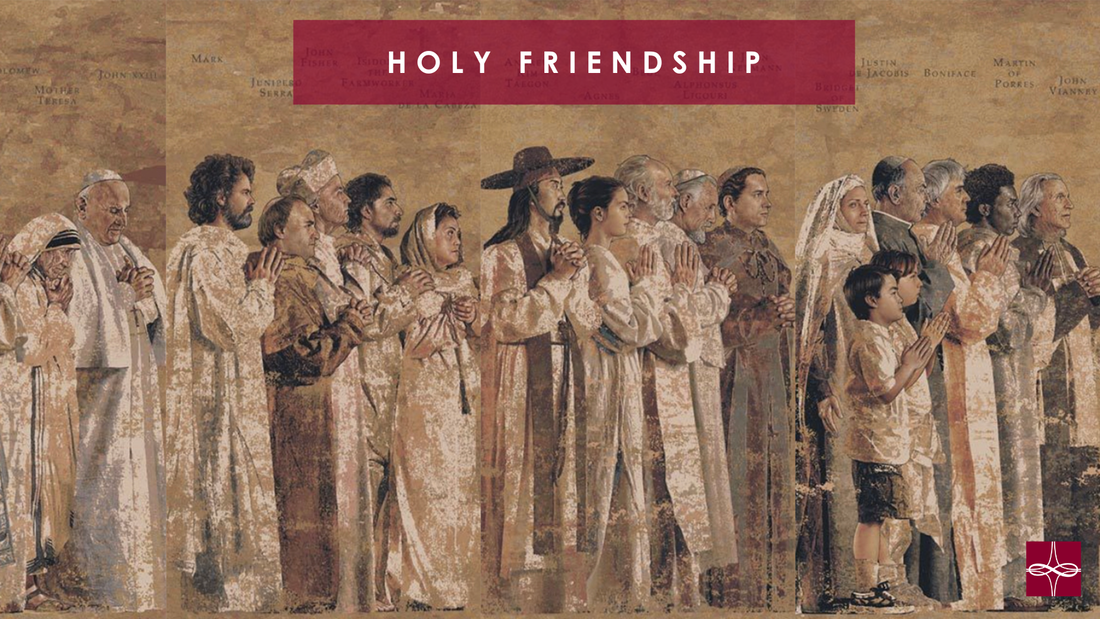
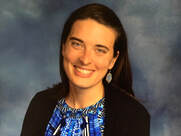




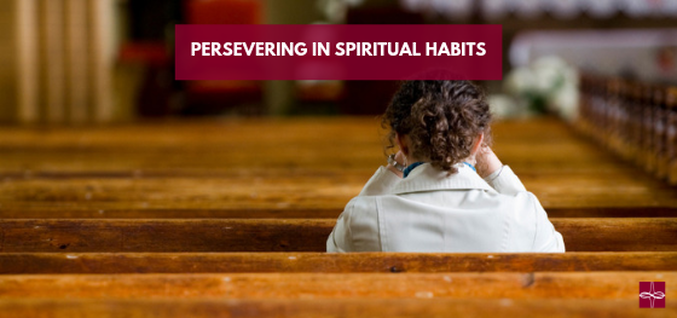



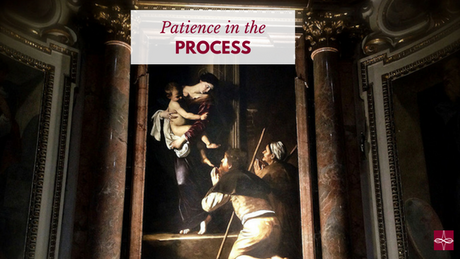

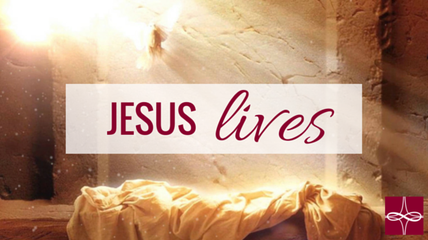







 RSS Feed
RSS Feed